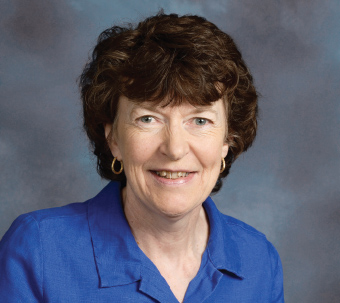Executive Director, Hospice Council of West Virginia

By Jean Hardiman
When Chris Zinn came to West Virginia from her native Scotland in the early 1980s, she brought a passion for the newly emerging field of hospice care and, fortunately for West Virginians, a wealth of knowledge from the United Kingdom, where the movement began.
Today, Zinn leads end-of-life care at the state level as the executive director of the Hospice Council of West Virginia. She oversees efforts to educate West Virginians about the hospice and palliative care services available to help provide comfort, choices and dignity to the seriously ill and their loved ones during their final days.
It is work she’s been doing in different forms for decades, beginning with writing newspaper editorials and newsletters to the medical community and bringing medical students on hospice calls and now lobbying for state and federal funds and supportive policies and keeping the state’s hospice organizations informed of the latest news and regulations.
“In the beginning, we had to provide a lot of education, build relationships with the medical community and show them what was possible with hospice,” says Zinn. “We had to find ways to share what the care meant to people and how it was more about living than dying, how they wanted to be at home and in control and how much more peaceful and meaningful death could be.”
Zinn did not foresee her career in hospice care. She was studying French and philosophy at the University of Edinburgh in Scotland when a summer job in a hospital enlightened her about the importance of the work.
“One of the young patients I helped with was terminally ill. She needed emotional support as well as physical care,” she recalls. “She taught me about the value of nursing and the need for compassion.”
After earning her bachelor’s degree, Zinn changed gears and enrolled in a nursing program at the Royal Infirmary of Edinburgh and become a certified nurse midwife. After coming to the U.S., she completed the RN to BSN program at West Virginia University’s Charleston campus and received her master’s degree in palliative care from the University of Glasgow.
Zinn joined HospiceCare in Charleston in its early years, first working as a nurse volunteer and then as its first hired nurse. In 2001, Zinn established HospiceCare’s Hubbard Hospice House in Charleston—West Virginia’s first hospice inpatient facility and a model in the state for the facilities that have followed—where she was administrator until 2007.
Zinn has never relented in her efforts to empower and comfort the seriously ill and their families and make their experiences less challenging and more meaningful. In 2018, she helped advocate for the palliative care bill, and she’s supported the preservation of West Virginia’s Certificate of Need to sustain hospice care in rural communities. She has also advocated for the passage of the Rural Access to Hospice Act and supports more substantial palliative care benefits.
“I have been inspired by the way we all come together to work for a common goal,” she says of West Virginia hospice leaders. “We all share the same mission and that is to provide the very best care to West Virginians facing a serious illness and to support their families.”
Zinn’s efforts have earned her recognition as the 2007 West Virginia Professional Woman of the Year, University of Glasgow’s 2011 Ann B. McNaught Prize recipient and Future of Nursing West Virginia’s 2018 40 Over 40 Nightingale Award winner. She considers the Hubbard House her greatest career achievement and has enjoyed how it has made hospice more visible and involved other community groups, such as faith communities, garden clubs, schools and civic groups. She has also been involved with West Virginians for Affordable Health Care, Faith in Action of the Greater Kanawha Valley and First Presbyterian Church in Charleston, where she has served as a deacon, demonstrating her great love for her adopted home.
“There were great opportunities for me in health care, and I arrived at a time when hospice was a grassroots movement and nurses were all volunteers,” says Zinn. “I believe I have been able to make a difference here. There are challenges and opportunities here, and Mountaineers can pull together to bring about change.”







